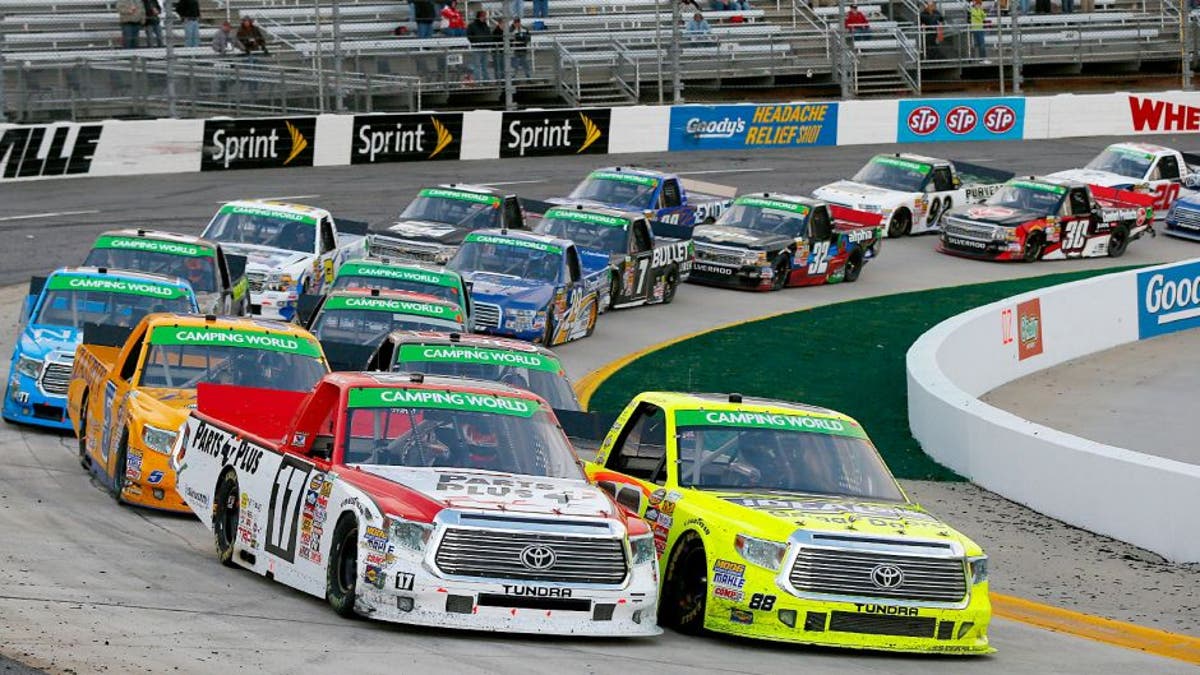
MARTINSVILLE, VA - MARCH 30: Timothy Peters, driver of the #17 Parts Plus Toyota, and Matt Crafton, driver of the #88 Ideal Doors / Menards Toyota, lead the field to a restart during the NASCAR Camping World Truck Series Kroger 250 at Martinsville Speedway on March 30, 2014 in Martinsville, Virginia. (Photo by Matt Sullivan/Getty Images)
When the NASCAR Camping World Truck Series takes the green flag on Saturday at New Hampshire Motor Speedway it will mark the 500th start for the series.
Once just a dream and a gamble, the Truck Series has become one of the most competitive and entertaining series in all of NASCAR.
While the series enjoys immense popularity today, its roots go back to an experimental race truck taking laps around Daytona International Speedway in 1994. After team owner Jimmy Smith took his truck around the "World Center of Racing," the conversations about a NASCAR truck series began to pick up speed.
The first exhibition truck race took place on July 30, 1994 at Mesa Marin Raceway in Bakersfield, Calif. There were five trucks entered in the 20-lap event that was won by P.J. Jones.
After a series of tests and exhibition races, NASCAR announced the inaugural NASCAR SuperTruck Series season would take place in 1995.
The first official NASCAR SuperTruck Series race took place on Feb. 5, 1995 at Phoenix International Raceway. A total of 33 trucks took the green flag to kick off the next chapter in NASCAR history.
That first race was a sign of things to come for the series, as it featured a heated battle for the win between future series champion Mike Skinner and Sprint Cup regular Terry Labonte. Despite a late-race charge from Labonte, Skinner was able to hold on to give team owner Richard Childress the big win.
The inaugural season saw the trucks compete in 20 races at 18 different tracks. Skinner not only scored the victory in the inaugural race at Phoenix, he also won a total of eight races and hoisted the championship trophy at the end of that first season.
In 1996 the series became the Craftsman Truck Series, an entitlement sponsor that would remain until 2009, when Camping World stepped in to fill the role.
The series initially featured a mandatory mid-race break, which allowed teams to work on their trucks and also allowed television crews to interview drivers in the middle of an event. The break was eventually dropped as the series continued to grow and move to larger tracks.
In 2000, the Truck Series made its debut at Daytona International Speedway in a big way. The race saw two- and three-wide racing throughout, but also saw one of the most spectacular wrecks in NASCAR history, as Geoffrey Bodine's truck became airborne in the tri-oval, hit the catchfence and disintegrated in a fiery ball as he tumbled down the track. Bodine suffered life-threatening injuries, but was able to recover.
Throughout the years, the series continued grow and attract new, young drivers starting out their NASCAR careers. Sprint Cup stars such as Greg Biffle, Kurt and Kyle Busch, Carl Edwards, Kevin Harvick and Brad Keselowski all got their starts racing in the Truck Series.
In addition, the series also became a place for seasoned veterans such as Hornaday, Skinner, Johnny Benson, Todd Bodine, Bobby Hamilton, Ted Musgrave and Joe Ruttman, just to name a few.
The Truck Series became the playground of Hornaday, Skinner and Jack Sprague, as their battles helped build the popularity and excitement of the series. Hornaday leads all drivers in career wins (51) and championships (four), while Skinner took the inaugural win and championship. Sprague recorded three championships and 28 victories, third all-time.
As their time began to pass, Kyle Busch moved into the spotlight and began dominating the series in a big way. Busch has three owner championships and is second on the all-time series win list. Taking the checkered flag in 44 of his 128 starts, Busch has a remarkable win percentage of 34 percent.
Last year, Matt Crafton became the first driver in series history to win back-to-back championship titles. With seven races left in the season, Crafton is third in the standings with a chance at a third title.
When Cole Custer won from the pole at New Hampshire Motor Speedway in 2014, he made NASCAR history by becoming the youngest winner in a national touring series race at 16 years, seven months and 28 days.
Through 499 starts, the Camping World Truck Series has seen 90 different winners, raced at 50 different tracks, run 83,033 laps -- the equivalent of 90,148 miles -- while featuring some of the biggest names in NASCAR.
The Camping World Truck Series continues to be one of the most exciting and entertaining racing series around, and still serves a dual purpose as a playground for the veterans and a place to develop young talent.
